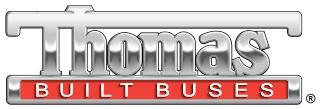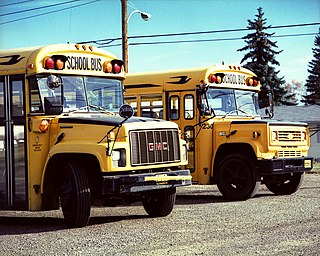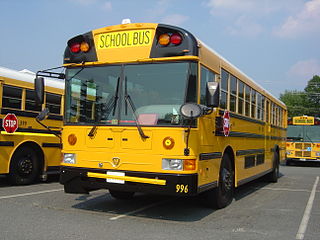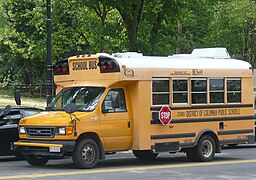
The Blue Bird Corporation is an American bus manufacturer headquartered in Fort Valley, Georgia. Best known for its production of school buses, the company has also manufactured a wide variety of other bus types, including transit buses, motorhomes, and specialty vehicles such as mobile libraries and mobile police command centers. Currently, Blue Bird concentrates its product lineup on school buses, school pupil activity buses (SPAB) and specialty vehicle derivatives.

A school bus is any type of bus owned, leased, contracted to, or operated by a school or school district. It is regularly used to transport students to and from school or school-related activities, but not including a charter bus or transit bus. Various configurations of school buses are used worldwide; the most iconic examples are the yellow school buses of the United States which are also found in other parts of the world.
Freightliner Trucks is a US semi truck manufacturer. Founded in 1929 as the truck-manufacturing division of Consolidated Freightways, the company was established in 1942 as Freightliner Corporation. Owned by Daimler AG from 1981 to 2021, Freightliner is now a part of Daimler Truck subsidiary Daimler Truck North America.

Kenworth Truck Company is an American truck manufacturer. Founded in 1923 as the successor to Gersix Motor Company, Kenworth specializes in production of heavy-duty and medium-duty commercial vehicles. Headquartered in the Seattle suburb of Kirkland, Washington, Kenworth has been a wholly owned subsidiary of PACCAR since 1945, operating alongside sister company Peterbilt Motors.
The Wayne Corporation was an American manufacturer of buses and other vehicles under the "Wayne" marque. The corporate headquarters were in Richmond, Indiana, in Wayne County, Indiana. During the middle 20th century, Wayne served as a leading producer of school buses in North America.

Thomas Built Buses, Inc. is an American bus manufacturer. Best known for its production of the first ever rear engine Type C school bus. Thomas produces other bus designs for a variety of usages. Currently, its production is concentrated on school buses and activity buses, along with their commercial derivatives.

Carpenter Body Works is a defunct American bus manufacturer. Founded in 1918 in Mitchell, Indiana, the company produced a variety of vehicles, with the majority of production consisting of yellow school buses for the United States and Canada.

Avia Motors s.r.o. is a Czech automotive manufacturer. It was founded in 1919 as an aircraft maker, and diversified into trucks after 1945. As an aircraft maker it was notable for producing biplane fighter aircraft, especially the B-534. Avia ceased aircraft production in 1963.
Girardin Minibus Inc. is a Canadian bus manufacturer. Based in Drummondville, Quebec, Canada, Girardin forms part of the Micro Bird joint venture with Blue Bird Corporation. As part of Micro Bird, Girardin is a manufacturer of bus bodies for minibuses for cutaway van chassis.
Collins Industries is an American bus manufacturer headquartered in South Hutchinson, Kansas. Best known for production of yellow school buses, the company produces buses for multiple applications; all bodies designed by the company have been produced for cutaway van chassis.

The Crown Coach Corporation is a defunct American bus manufacturer. Founded in 1904, the company was best known for its Supercoach range of yellow school buses and motorcoaches; the former vehicles were marketed throughout the West Coast of the United States. Competing alongside Gillig Corporation and similar its Gillig Transit Coach, the two companies supplied California with school buses nearly exclusively into the 1980s.
American Transportation Corporation was an American manufacturer of school bus bodies. Tracing its roots to Ward Body Works, AmTran was formed in 1980 following the 1979 bankruptcy of Ward to continue bus production. In 1991, the company became a subsidiary of Navistar International, leading to a series of acquisitions of school bus body manufacturers by chassis suppliers during the 1990s.

The Chevrolet and GMC B series was a series of cowled chassis that were produced by General Motors. Produced across three generations from 1966 to 2003, the model line was a variant of medium-duty trucks marketed under the Chevrolet and GMC nameplates. Initially derived from the medium-duty C/K series, later examples were derived from the GMT530 architecture.

The Thomas Saf-T-Liner C2 is a cowled-chassis bus manufactured by bus body manufacturer Thomas Built Buses. Introduced in 2004, the vehicle is produced primarily as a school bus; other configurations of the model line were developed for commercial use and specialty configurations.

The International 3000 Series is a transit-style bus chassis manufactured by Navistar International, used for school bus and commercial bus applications. In production since 1990, it has been produced in both front and rear-engine configurations.
The bus chassis variant of the International S series is a cowled bus chassis that was produced by International Harvester from 1979 to 2001. Produced primarily for school bus applications, the chassis was also produced for other applications, including commercial-use buses and cutaway-cab buses. In addition, the cowled chassis formed the basis for front-engine and rear-engine stripped chassis produced for bus applications.

The Blue Bird All American is a series of buses produced by American school bus manufacturer Blue Bird Corporation since 1948. Originally developed as a yellow school bus, versions of the All American have been designed for a wide variety of applications, ranging from the Blue Bird Wanderlodge luxury motorhome to buses for law enforcement use.
The Wayne Lifestar is a product line of buses that was manufactured and marketed by Wayne Corporation and its successor company Wayne Wheeled Vehicles from 1986 to 1995. Produced nearly exclusively in a school bus configuration, the Wayne Lifestar used a transit-style body configuration with a front-engine chassis. Marking the return to transit-style production, the Lifestar adopted the single-piece body stampings of the Wayne Lifeguard in its construction.
The Blue Bird Micro Bird is a bus body produced in the United States and Canada by Blue Bird Corporation. First introduced in 1975, the Micro Bird body is combined with a cutaway van chassis, with passenger capacity ranging from 10 to 30 passengers. While most examples are produced as a school bus, the Micro Bird has been sold in various configurations, including commercial-use minibuses and as a MFSAB. MFSABs are alternatives to 15-passenger vans; examples have come into use by child care centers and other organizations due to updated safety regulations.
The Lion Electric Company, is a Canadian-based manufacturer of commercial vehicles. Currently the biggest electric vehicle manufacturer in its segment, Lion primarily produces yellow school buses, public transit buses, semi-trucks, bucket trucks, and garbage/refuse trucks.















